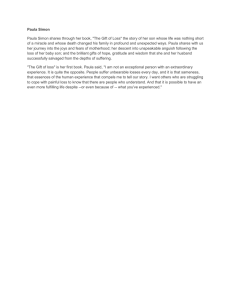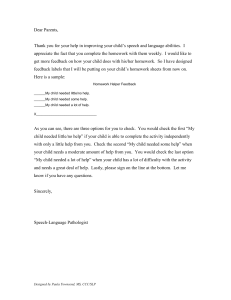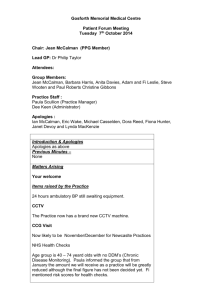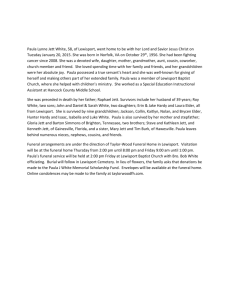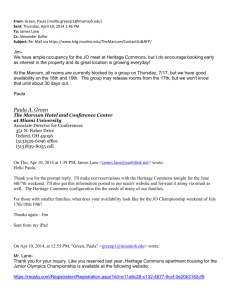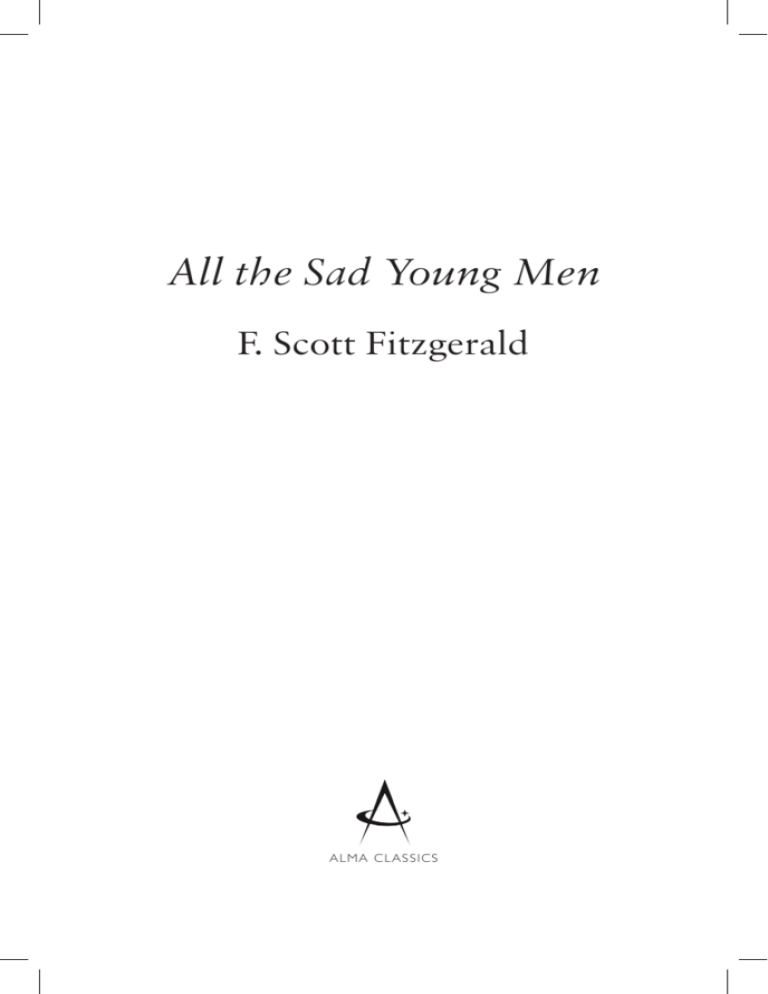
All the Sad Young Men
F. Scott Fitzgerald
AL MA CL AS S I CS
Alma Classics Ltd
London House
243-253 Lower Mortlake Road
Richmond
Surrey TW9 2LL
United Kingdom
www.almaclassics.com
All the Sad Young Men first published in 1926
This edition first published by Alma Books Ltd in 2013
Cover image © Corbis Images
Extra material © Richard Parker
Notes © Alma Classics Ltd
Printed and bound by CPI Group (UK) Ltd, Croydon, CR0 4YY
isbn: 978-1-84749-304-0
All the pictures in this volume are reprinted with permission or pre­sumed
to be in the public domain. Every effort has been made to ascertain and
acknowledge their copyright status, but should there have been any
unwitting oversight on our part, we would be happy to rectify the error
in subsequent printings.
All rights reserved. No part of this publication may be reproduced, stored
in or introduced into a retrieval system, or transmitted, in any form or
by any means (electronic, mechanical, photocopying, recording or otherwise), without the prior written permission of the publisher. This book is
sold subject to the condition that it shall not be resold, lent, hired out or
otherwise circulated without the express prior consent of the publisher.
Contents
All the Sad Young Men
1
The Rich Boy3
Winter Dreams42
The Baby Party66
Absolution79
Rags Martin-Jones and the Pr–nce of W–les96
The Adjuster116
Hot and Cold Blood139
“The Sensible Thing”155
Gretchen’s Forty Winks170
Note on the Text191
Notes191
Extra Material
F. Scott Fitzgerald’s Life
F. Scott Fitzgerald’s Works
Select Bibliography
193
195
205
210
All the Sad Young Men
The Rich Boy
I
B
egin with an individual and before you know it you
find that you have created a type; begin with a type, and
you find that you have created – nothing. That is because we are
all queer fish, queerer behind our faces and voices than we want
anyone to know or than we know ourselves. When I hear a man
proclaiming himself an “average, honest, open fellow” I feel pretty
sure that he has some definite and perhaps terrible abnormality
which he has agreed to conceal – and his protestation of being
average and honest and open is his way of reminding himself of
his misprision.
There are no types, no plurals. There is a rich boy, and this is
his and not his brothers’ story. All my life I have lived among his
brothers, but this one has been my friend. Besides, if I wrote about
his brothers I should have to begin by attacking all the lies that the
poor have told about the rich and the rich have told about themselves – such a wild structure they have erected that when we pick
up a book about the rich, some instinct prepares us for unreality.
Even the intelligent and impassioned reporters of life have made
the country of the rich as unreal as fairyland.
Let me tell you about the very rich. They are different from
you and me. They possess and enjoy early, and it does something
to them, makes them soft where we are hard and cynical where
we are trustful, in a way that, unless you were born rich, it is
very difficult to understand. They think, deep in their hearts,
that they are better than we are, because we had to discover the
compensations and refuges of life for ourselves. Even when they
enter deep into our world or sink below us, they still think that
they are better than we are. They are different. The only way I
3
all the sad young men
can describe young Anson Hunter is to approach him as if he
were a foreigner and cling stubbornly to my point of view. If I
accept his for a moment I am lost – I have nothing to show but
a preposterous movie.
II
A
nson was the eldest of six children who would some day
divide a fortune of fifteen million dollars, and he reached the
age of reason – is it seven? – at the beginning of the century when
daring young women were already gliding along Fifth Avenue in
electric “mobiles”. In those days he and his brother had an English
governess who spoke the language very clearly and crisply and
well, so that the two boys grew to speak as she did – their words
and sentences were all crisp and clear and not run together as ours
are. They didn’t talk exactly like English children, but acquired
an accent that is peculiar to fashionable people in the city of New
York.
In the summer the six children were moved from the house on 71st
Street to a big estate in northern Connecticut. It was not a fashionable locality – Anson’s father wanted to delay as long as possible his
children’s knowledge of that side of life. He was a man somewhat
superior to his class, which composed New York society, and to
his period, which was the snobbish and formalized vulgarity of the
Gilded Age, and he wanted his sons to learn habits of concentration and have sound constitutions and grow up into right-living
and successful men. He and his wife kept an eye on them as well
as they were able until the two older boys went away to school, but
in huge establishments this is difficult – it was much simpler in the
series of small- and medium-sized houses in which my own youth
was spent – I was never far out of the reach of my mother’s voice,
of the sense of her presence, her approval or disapproval.
Anson’s first sense of his superiority came to him when he realized the half-grudging American deference that was paid to him
in the Connecticut village. The parents of the boys he played with
always enquired after his father and mother, and were vaguely
4
the rich boy
excited when their own children were asked to the Hunters’ house.
He accepted this as the natural state of things, and a sort of impatience with all groups of which he was not the centre – in money,
in position, in authority – remained with him for the rest of his
life. He disdained to struggle with other boys for precedence – he
expected it to be given him freely, and when it wasn’t he withdrew
into his family. His family was sufficient, for in the East money is
still a somewhat feudal thing, a clan-forming thing. In the snobbish
West, money separates families to form “sets”.
At eighteen, when he went to New Haven, Anson was tall and
thick-set, with a clear complexion and a healthy colour from the
ordered life he had led in school. His hair was yellow and grew in a
funny way on his head, his nose was beaked – these two things kept
him from being handsome – but he had a confident charm and a
certain brusque style, and the upper-class men who passed him on
the street knew without being told that he was a rich boy and had
gone to one of the best schools. Nevertheless his very superiority
kept him from being a success in college – the independence was
mistaken for egotism, and the refusal to accept Yale standards with
the proper awe seemed to belittle all those who had. So, long before
he graduated, he began to shift the centre of his life to New York.
He was at home in New York – there was his own house with “the
kind of servants you can’t get any more” – and his own family, of
which, because of his good humour and a certain ability to make
things go, he was rapidly becoming the centre, and the debutante
parties, and the correct manly world of the men’s clubs, and the
occasional wild spree with the gallant girls whom New Haven only
knew from the fifth row. His aspirations were conventional enough
– they included even the irreproachable shadow he would some
day marry, but they differed from the aspirations of the majority
of young men in that there was no mist over them, none of that
quality which is variously known as “idealism” or “illusion”.
Anson accepted without reservation the world of high finance
and high extravagance, of divorce and dissipation, of snobbery
and of privilege. Most of our lives end as a compromise – it was
as a compromise that his life began.
5
all the sad young men
He and I first met in the late summer of 1917 when he was just
out of Yale and, like the rest of us, was swept up into the systematized hysteria of the war. In the blue-green uniform of the naval
aviation he came down to Pensacola, where the hotel orchestras
played ‘I’m Sorry, Dear’* and we young officers danced with the
girls. Everyone liked him, and though he ran with the drinkers and
wasn’t an especially good pilot, even the instructors treated him
with a certain respect. He was always having long talks with them
in his confident, logical voice – talks which ended by his getting
himself, or more frequently another officer, out of some impending trouble. He was convivial, bawdy, robustly avid for pleasure,
and we were all surprised when he fell in love with a conservative
and rather proper girl.
Her name was Paula Legendre, a dark, serious beauty from
somewhere in California. Her family kept a winter residence
just outside of town, and in spite of her primness she was
enormously popular; there is a large class of men whose egotism can’t endure humour in a woman. But Anson wasn’t that
sort, and I couldn’t understand the attraction of her “sincerity” – that was the thing to say about her – for his keen and
somewhat sardonic mind.
Nevertheless, they fell in love – and on her terms. He no longer
joined the twilight gathering at the De Soto bar, and whenever they
were seen together they were engaged in a long, serious dialogue,
which must have gone on several weeks. Long afterwards he told
me that it was not about anything in particular, but was composed
on both sides of immature and even meaningless statements – the
emotional content that gradually came to fill it grew up not out
of the words but out of its enormous seriousness. It was a sort of
hypnosis. Often it was interrupted, giving way to that emasculated
humour we call fun; when they were alone it was resumed again
– solemn, low-keyed and pitched so as to give each other a sense
of unity in feeling and thought. They came to resent any interruptions of it, to be unresponsive to facetiousness about life, even to
the mild cynicism of their contemporaries. They were only happy
when the dialogue was going on and its seriousness bathed them
6
the rich boy
like the amber glow of an open fire. Towards the end there came
an interruption they did not resent – it began to be interrupted
by passion.
Oddly enough Anson was as engrossed in the dialogue as she
was and as profoundly affected by it, yet at the same time aware
that on his side much was insincere and on hers much was merely
simple. At first too, he despised her emotional simplicity as well,
but with his love her nature deepened and blossomed, and he could
despise it no longer. He felt that if he could enter into Paula’s
warm safe life he would be happy. The long preparation of the
dialogue removed any constraint – he taught her some of what
he had learnt from more adventurous women and she responded
with a rapt holy intensity. One evening after a dance they agreed
to marry and he wrote a long letter about her to his mother. The
next day Paula told him that she was rich, that she had a personal
fortune of nearly a million dollars.
III
I
t was exactly as if they could say “Neither of us has
anything: we shall be poor together” – just as delightful that
they should be rich instead. It gave them the same communion
of adventure. Yet when Anson got leave in April and Paula and
her mother accompanied him north, she was impressed with the
standing of his family in New York and with the scale on which
they lived. Alone with Anson for the first time in the rooms
where he had played as a boy, she was filled with a comfortable
emotion, as though she were pre-eminently safe and taken care
of. The pictures of Anson in a skullcap at his first school, of
Anson on horseback with the sweetheart of a mysterious forgotten summer, of Anson in a gay group of ushers and bridesmaids
at a wedding, made her jealous of his life apart from her in the
past, and so completely did his authoritative person seem to
sum up and typify these possessions of his that she was inspired
with the idea of being married immediately and returning to
Pensacola as his wife.
7
all the sad young men
But an immediate marriage wasn’t discussed – even the engagement was to be secret until after the war. When she realized that
only two days of his leave remained, her dissatisfaction crystallized
in the intention of making him as unwilling to wait as she was.
They were driving to the country for dinner and she determined
to force the issue that night.
Now a cousin of Paula’s was staying with them at the Ritz, a
severe bitter girl who loved Paula but was somewhat jealous of
her impressive engagement, and as Paula was late in dressing,
the cousin, who wasn’t going to the party, received Anson in the
parlour of the suite.
Anson had met friends at five o’clock and drunk freely and
indiscreetly with them for an hour. He left the Yale Club at a
proper time, and his mother’s chauffeur drove him to the Ritz,
but his usual capacity was not in evidence, and the impact of the
steam-heated sitting room made him suddenly dizzy. He knew it,
and he was both amused and sorry.
Paula’s cousin was twenty-five, but she was exceptionally naive,
and at first failed to realize what was up. She had never met
Anson before, and she was surprised when he mumbled strange
information and nearly fell off his chair, but until Paula appeared
it didn’t occur to her that what she had taken for the odour of a
dry-cleaned uniform was really whiskey. But Paula understood as
soon as she appeared; her only thought was to get Anson away
before her mother saw him, and at the look in her eyes the cousin
understood too.
When Paula and Anson descended to the limousine they found
two men inside, both asleep; they were the men with whom he had
been drinking at the Yale Club, and they were also going to the party.
He had entirely forgotten their presence in the car. On the way to
Hempstead they awoke and sang. Some of the songs were rough, and
though Paula tried to reconcile herself to the fact that Anson had
few verbal inhibitions, her lips tightened with shame and distaste.
Back at the hotel the cousin, confused and agitated, considered
the incident, and then walked into Mrs Legendre’s bedroom saying:
“Isn’t he funny?”
8
the rich boy
“Who is funny?”
“Why – Mr Hunter. He seemed so funny.”
Mrs Legendre looked at her sharply.
“How is he funny?”
“Why, he said he was French. I didn’t know he was French.”
“That’s absurd. You must have misunderstood.” She smiled.
“It was a joke.”
The cousin shook her head stubbornly.
“No. He said he was brought up in France. He said he couldn’t
speak any English and that’s why he couldn’t talk to me. And he
couldn’t!”
Mrs Legendre looked away with impatience just as the cousin
added thoughtfully, “Perhaps it was because he was so drunk,”
and walked out of the room.
This curious report was true. Anson, finding his voice thick and
uncontrollable, had taken the unusual refuge of announcing that
he spoke no English. Years afterwards he used to tell that part of
the story, and he invariably communicated the uproarious laughter
which the memory aroused in him.
Five times in the next hour Mrs Legendre tried to get Hempstead
on the phone. When she succeeded there was a ten-minute delay
before she heard Paula’s voice on the wire.
“Cousin Jo told me Anson was intoxicated.”
“Oh, no…”
“Oh, yes. Cousin Jo says he was intoxicated. He told her he was
French and fell off his chair and behaved as if he was very intoxicated. I don’t want you to come home with him.”
“Mother, he’s all right! Please don’t worry about—”
“But I do worry. I think it’s dreadful. I want you to promise me
not to come home with him.”
“I’ll take care of it, Mother…”
“I don’t want you to come home with him.”
“All right, Mother. Goodbye.”
“Be sure now, Paula. Ask someone to bring you.”
Deliberately Paula took the receiver from her ear and hung it up.
Her face was flushed with helpless annoyance. Anson was stretched
9
all the sad young men
asleep out in a bedroom upstairs, while the dinner party below was
proceeding lamely towards conclusion.
The hour’s drive had sobered him somewhat – his arrival
was merely hilarious – and Paula hoped that the evening was
not spoilt after all, but two imprudent cocktails before dinner
completed the disaster. He talked boisterously and somewhat
offensively to the party at large for fifteen minutes and then slid
silently under the table, like a man in an old print – but, unlike
an old print, it was rather horrible without being at all quaint.
None of the young girls present remarked upon the incident –
it seemed to merit only silence. His uncle and two other men
carried him upstairs, and it was just after this that Paula was
called to the phone.
An hour later Anson awoke in a fog of nervous agony, through
which he perceived after a moment the figure of his Uncle Robert
standing by the door.
“…I said are you better?”
“What?”
“Do you feel better, old man?”
“Terrible,” said Anson.
“I’m going to try you on another bromo-seltzer. If you can hold
it down, it’ll do you good to sleep.”
With an effort, Anson slid his legs from the bed and stood up.
“I’m all right,” he said dully.
“Take it easy.”
“I thin’ if you gave me a glassbrandy I could go downstairs.”
“Oh, no—”
“Yes, that’s the only thin’. I’m all right now… I suppose I’m in
dutch dow’ there.”
“They know you’re a little under the weather,” said his uncle
deprecatingly. “But don’t worry about it. Schuyler didn’t even get
here. He passed away in the locker room over at the Links.”
Indifferent to any opinion, except Paula’s, Anson was nevertheless determined to save the debris of the evening, but when after a
cold bath he made his appearance most of the party had already
left. Paula got up immediately to go home.
10
the rich boy
In the limousine the old serious dialogue began. She had known
that he drank, she admitted, but she had never expected anything
like this – it seemed to her that perhaps they were not suited to
each other after all. Their ideas about life were too different, and
so forth. When she finished speaking, Anson spoke in turn, very
soberly. Then Paula said she’d have to think it over; she wouldn’t
decide tonight; she was not angry but she was terribly sorry. Nor
would she let him come into the hotel with her, but just before she
got out of the car she leant and kissed him unhappily on the cheek.
The next afternoon Anson had a long talk with Mrs Legendre
while Paula sat listening in silence. It was agreed that Paula was to
brood over the incident for a proper period and then, if mother and
daughter thought it best, they would follow Anson to Pensacola.
On his part he apologized with sincerity and dignity – that was all;
with every card in her hand Mrs Legendre was unable to establish
any advantage over him. He made no promises, showed no humility,
only delivered a few serious comments on life which brought him
off with rather a moral superiority at the end. When they came
south three weeks later, neither Anson in his satisfaction nor Paula
in her relief at the reunion realized that the psychological moment
had passed for ever.
IV
H
e dominated and attracted her and at the same time
filled her with anxiety. Confused by his mixture of solidity
and self-indulgence, of sentiment and cynicism – incongruities
which her gentle mind was unable to resolve – Paula grew to
think of him as two alternating personalities. When she saw him
alone, or at a formal party, or with his casual inferiors, she felt a
tremendous pride in his strong attractive presence, the paternal,
understanding stature of his mind. In other company she became
uneasy when what had been a fine imperviousness to mere gentility
showed its other face. The other face was gross, humorous, reckless
of everything but pleasure. It startled her mind temporarily away
from him, even led her into a short covert experiment with an old
11
all the sad young men
beau, but it was no use – after four months of Anson’s enveloping
vitality there was an anaemic pallor in all other men.
In July he was ordered abroad, and their tenderness and desire
reached a crescendo. Paula considered a last-minute marriage –
decided against it only because there were always cocktails on his
breath now, but the parting itself made her physically ill with grief.
After his departure she wrote him long letters of regret for the
days of love they had missed by waiting. In August Anson’s plane
slipped down into the North Sea. He was pulled onto a destroyer
after a night in the water and sent to hospital with pneumonia; the
armistice was signed before he was finally sent home.
Then, with every opportunity given back to them, with no material obstacle to overcome, the secret weavings of their temperaments
came between them, drying up their kisses and their tears, making
their voices less loud to one another, muffling the intimate chatter of their hearts until the old communication was only possible
by letters from far away. One afternoon a society reporter waited
for two hours in the Hunters’ house for a confirmation of their
engagement. Anson denied it; nevertheless an early issue carried
the report as a leading paragraph – they were “constantly seen
together at Southampton, Hot Springs and Tuxedo Park”. But
the serious dialogue had turned a corner into a long, sustained
quarrel, and the affair was almost played out. Anson got drunk
flagrantly and missed an engagement with her, whereupon Paula
made certain behaviouristic demands. His despair was helpless
before his pride and his knowledge of himself: the engagement
was definitely broken.
“Dearest,” said their letters now, “Dearest, Dearest, when I wake
up in the middle of the night and realize that after all it was not to
be, I feel that I want to die. I can’t go on living any more. Perhaps
when we meet this summer we may talk things over and decide
differently – we were so excited and sad that day and I don’t feel
that I can live all my life without you. You speak of other people.
Don’t you know there are no other people for me but only you…”
But as Paula drifted here and there around the East she would
sometimes mention her gaieties to make him wonder. Anson was
12
the rich boy
too acute to wonder. When he saw a man’s name in her letters he
felt more sure of her and a little disdainful – he was always superior
to such things. But he still hoped that they would some day marry.
Meanwhile he plunged vigorously into all the movement and glitter of post-bellum New York, entering a brokerage house, joining
half a dozen clubs, dancing late, and moving in three worlds – his
own world, the world of young Yale graduates and that section
of the half-world which rests one end on Broadway. But there was
always a thorough and infractible eight hours devoted to his work
in Wall Street, where the combination of his influential family
connection, his sharp intelligence and his abundance of sheer
physical energy brought him almost immediately forward. He had
one of those invaluable minds with partitions in it; sometimes he
appeared at his office refreshed by less than an hour’s sleep, but
such occurrences were rare. So early as 1920 his income in salary
and commissions exceeded twelve thousand dollars.
As the Yale tradition slipped into the past, he became more and
more of a popular figure among his classmates in New York, more
popular than he had ever been in college. He lived in a great house
and had the means of introducing young men into other great
houses. Moreover, his life already seemed secure, while theirs, for
the most part, had arrived again at precarious beginnings. They
commenced to turn to him for amusement and escape, and Anson
responded readily, taking pleasure in helping people and arranging
their affairs.
There were no men in Paula’s letters now, but a note of tenderness ran through them that had not been there before. From several
sources he heard that she had “a heavy beau”, Lowell Thayer, a
Bostonian of wealth and position, and though he was sure she still
loved him, it made him uneasy to think that he might lose her after
all. Save for one unsatisfactory day she had not been in New York
for almost five months, and as the rumours multiplied he became
increasingly anxious to see her. In February he took his vacation
and went down to Florida.
Palm Beach sprawled plump and opulent between the sparkling
sapphire of Lake Worth, flawed here and there by houseboats at
13

